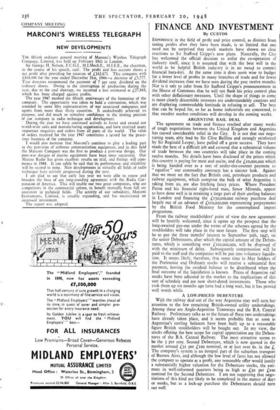FINANCE AND INVESTMENT
By CUSTOS
EXPERIENCE in the field of profit and price control, as distinct from taxing profits after they have been made, is so limited that one need not be surprised that stock markets have shown no clear reactions to Sir Stafford Cripps's new plans. Naturally, the City has welcomed the official decision to enlist the co-operation of industry itself, since it is assumeti that with the best will in the world to be helpful British industry is in no mood to commit financial hara-kiri. At the same time it does seem wise to budget for a lower level of profits in many branches of trade and for fewer dividend increases than we have seen during the past twelve months. Nor is it safe to infer from Sir Stafford Cripps's pronouncement in the House of Commons that he will not flank his price control plan with other deflationary measures. Until the shape of things to come is more clearly discernible investors are understandably cautious and are displaying commendable fortitude in refusing to sell. The best that can be hoped for, so far as home industrials are concerned, is that steadier market conditions will develop in the coming weeks.
ARGENTINE RAIL DEAL The agreement on trade and finance reached after many weeks of tough negotiations between the United Kingdom and Argentina has caused considerable relief in the City. It is not that our nego- tiating team, ably lead by Sir Clive Baillieu and strongly reinforced by Sir Reginald Leeper, have pulled off a great success. They have made the best of a difficult job and ensured that a substantial volume of trade between the two countries will take place in the coming twelve months. No details have been disclosed of the prices which this country is paying for meat and maize, and the £to,000,000 which is being handed over as a sort of under-the-counter payment to " equalise " our commodity contracts has a sinister look. Against that we must set the fact that British coal, petroleum products and railway equipment, which comprise the bulk of what Argentina is taking from us, are also fetching fancy prices. Where President Peron and his financial right-hand man, Senor Miranda' appear to have done well is in retaining a large part of their sterling balances in London and financing the £150,000p00 railway purchase deal largely out of an advance of Li to,000,000 representing prepayments by the British Food Ministry for the contemplated import programme.
From the railway stockholders' point of view the new agreement will be heartily welcomed, since it opens up the prospect that the long-awaited pay-out under the terms of the schemes agreed by the stockholders will take place in the near future. The first step will be to pay the three months' interest to September 30th, 1947, on the senior Debentures, after which the capital amount of the Deben- tures, which is something over £too,000,000, will be disposed of with the minimum of delay. Subsequently compensation will be paid to the staff and the companies will be put into voluntary liquida- tion. It seems likely, therefore, that some time in May holders of the Preference and Ordinary stocks will receive a substantial first payment, leaving the residual balance to be distributed when the final outcome of the liquidation is known. Prices of Argentine rail stocks have been adjusted in the market to the implications of this sort of schedule and are now short-dated investments. Those who took them up six months ago have had a long wait, but it has proved well worth while.
A LOW-PRICED DEBENTURE .
With the railway deal out of the way Argentina may well turn her attention to the few remaining British-owned utility undertakings. Among these are Anglo-Argentine Tramways and the B.A. Central Railway. Preliminary talks as to the future of these two undertakings have already taken place, and it seems probable that as soon as Argentina's sterling balances have been built up to a reasonable figure British stockholders will be bought out. In my view, the stocks offering the best scope for capital appreciation are the Deben- tures of the B.A. Central Railway. The most attractive seems to be the 5 per cent. Second Debenture, which is now quoted in the market around £31 per £too nominal, or at just over 6s. in the £. The company's system is an integral part of the suburban transport of Buenos Aires, and although the low level of fares has not allowed the company to operate at a profit, any reasonable offer would justify a substantially higher valuation for the Debenture stocks, the esti- mate in, well-informed quarters being as high as £5o per £roo nominal for the Second Debenture. I am not suggesting that nego- tiations of this kind are likely to be completed in the matter of days or weeks, but as a lock-up purchase the Debentures should turn out well.






























 Previous page
Previous page